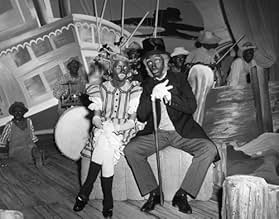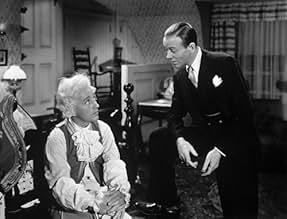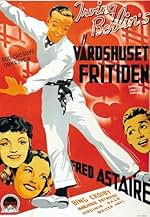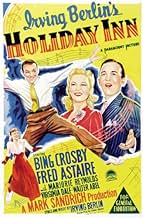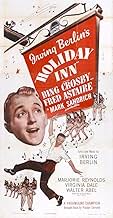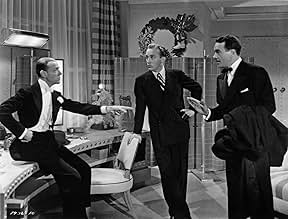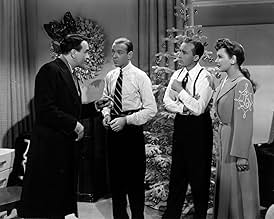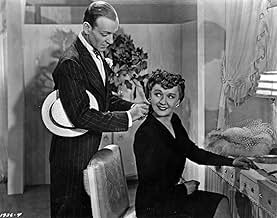VALUTAZIONE IMDb
7,3/10
18.859
LA TUA VALUTAZIONE
In una locanda aperta solo durante le vacanze, un ballerino ed un cantante competono per le attenzioni di una bella ragazzaIn una locanda aperta solo durante le vacanze, un ballerino ed un cantante competono per le attenzioni di una bella ragazzaIn una locanda aperta solo durante le vacanze, un ballerino ed un cantante competono per le attenzioni di una bella ragazza
- Regia
- Sceneggiatura
- Star
- Vincitore di 1 Oscar
- 3 vittorie e 2 candidature totali
Bob Crosby Orchestra
- Orchestra
- (as Bob Crosby's Band)
Edward Arnold Jr.
- Second Dancer Ted Bumps Into
- (non citato nei titoli originali)
Loretta Barnett
- Dancer
- (non citato nei titoli originali)
Muriel Barr
- Dancer
- (non citato nei titoli originali)
Harry Barris
- Midnight Club Orchestra Leader
- (non citato nei titoli originali)
Patsy Bedell
- Dancer
- (non citato nei titoli originali)
Recensioni in evidenza
This film is good in so many ways. The song and dance numbers were all great. Teaming Bing Crosby and Fred Astaire was a great idea. These two played off each other so well that I can't imagine two other actors doing so well. Even Crosby and Hope wouldn't have done as well here. Marjorie Reynolds was a treat to look at but also had good chemistry with both Crosby and Astaire. The support cast was equally as good, Walter Abel as Danny Reed, Virginia Dale as Lila Dixon and Louise Beavers as Mamie gave solid performances.
The set was also beautiful. Obviously the Hollywood set of Holiday Inn at the end of the film that was supposed to be a reproduction of the real Holiday Inn in Connecticut is the same set used for both scenes. However it is such a realistic set that the viewer never suspects that the Connecticut scenes were filmed indoors. I think the fact that the film was in black and white helps in that respect. A color film may have actually looked more phoney.
The story is a simple one but well put together. I think many viewers can relate to guys trying to steal girls from one another, its a common enough practice today. The ending is a bit fairy tale like but then that is why so many probably like it. We get enough "reality" in our every day lives. It is nice to escape reality with a film like this.
Lastly, the black face scene during the Lincoln Day performance is offensive but it does not ruin the film. Of course a minstrel show today using black face would be unacceptable in today's environment but you can't hold a 1940's film to the same standards. I know some would like to have that scene removed from the film but I disagree. I am of African American decent and while I could view this film as a disgrace I accept it for what it is. Rather than try and obliterate scenes such as this from our film history I think they should be viewed as stepping stones to where African Americans are in film today. There may still be barriers that need to be broken through in the film world but considering where African Americans started we as a society should also take time to appreciate the accomplishments that have been achieved. Black face is out. Demeaning "yesum" roles are for the most part gone and now leading roles that portray African Americans in well to do positions in society are becoming more and more frequent. So while some of the film history regarding African Americans portrays them in a negative manner it is because of those actors and actresses were able to work in those roles and under those conditions that the modern day African American actors and actresses are able be seen in a more positive light. Ignoring the past roles ignores the actors and actresses that struggled through those times.
The set was also beautiful. Obviously the Hollywood set of Holiday Inn at the end of the film that was supposed to be a reproduction of the real Holiday Inn in Connecticut is the same set used for both scenes. However it is such a realistic set that the viewer never suspects that the Connecticut scenes were filmed indoors. I think the fact that the film was in black and white helps in that respect. A color film may have actually looked more phoney.
The story is a simple one but well put together. I think many viewers can relate to guys trying to steal girls from one another, its a common enough practice today. The ending is a bit fairy tale like but then that is why so many probably like it. We get enough "reality" in our every day lives. It is nice to escape reality with a film like this.
Lastly, the black face scene during the Lincoln Day performance is offensive but it does not ruin the film. Of course a minstrel show today using black face would be unacceptable in today's environment but you can't hold a 1940's film to the same standards. I know some would like to have that scene removed from the film but I disagree. I am of African American decent and while I could view this film as a disgrace I accept it for what it is. Rather than try and obliterate scenes such as this from our film history I think they should be viewed as stepping stones to where African Americans are in film today. There may still be barriers that need to be broken through in the film world but considering where African Americans started we as a society should also take time to appreciate the accomplishments that have been achieved. Black face is out. Demeaning "yesum" roles are for the most part gone and now leading roles that portray African Americans in well to do positions in society are becoming more and more frequent. So while some of the film history regarding African Americans portrays them in a negative manner it is because of those actors and actresses were able to work in those roles and under those conditions that the modern day African American actors and actresses are able be seen in a more positive light. Ignoring the past roles ignores the actors and actresses that struggled through those times.
They don't get much better than this: Astaire with the drop dead dancing cool, and Crosby with the honey crooning, both competing for the same gal. Crosby decides to let it all go and settle in the country, then on a whim realizes he can open his country house as a club open on holidays only. The girl he ends up drafting for the floor shows ends up being the love of his life, and the dancing partner Astaire has always been searching for.
Astaire, Crosby, and Reynolds have great chemistry together: I thought it quite convincing how Crosby's overprotective zeal scared Reynolds away for a while, and Astaire was very cool and believable as a kind of an inoffensive opportunist who exploits Crosby's passionate responses to whatever threat he perceives in Astaire.
Top it off with many of Irving Berlin's best classic tunes, performed in interesting interpretations, and you have a very good musical film.
Astaire, Crosby, and Reynolds have great chemistry together: I thought it quite convincing how Crosby's overprotective zeal scared Reynolds away for a while, and Astaire was very cool and believable as a kind of an inoffensive opportunist who exploits Crosby's passionate responses to whatever threat he perceives in Astaire.
Top it off with many of Irving Berlin's best classic tunes, performed in interesting interpretations, and you have a very good musical film.
The source of the song "White Christmas" would be worth watching just for that, but in addition the movie has a bunch of wonderful dancing, and quite a lot of charming songs; "I'll Capture Your Heart Singing", "Come To Holiday Inn", "You're Easy to Dance With", "Oh How I Hate to Get up in the morning", "White Christmas", and "Happy Holiday" (all by Irving Berlin) are some of the highlights.
Anyone who is a fan of Crosby or Astaire will enjoy this movie. Marjorie Reynolds and Virginia Dale play perfect foils for Crosby and Astaire, supporting them.
The plot, what there is of it, is just enough to hang enough Muscial numbers on to keep the movie running along apace.
Anyone who is a fan of Crosby or Astaire will enjoy this movie. Marjorie Reynolds and Virginia Dale play perfect foils for Crosby and Astaire, supporting them.
The plot, what there is of it, is just enough to hang enough Muscial numbers on to keep the movie running along apace.
"Holiday Inn" is the story of singer/dancer entertainers (Fred Astaire, Bing Crosby, Virginia Dale) who work together in New York. As the group splits up, one seeking a more tranquil life style, a third entertainer comes on the scene as a young aspiring singer/dancer (Marjorie Reynolds). Hoping to break into the business, she meets and begins work with one of the successful members. Relationships develop and change. This film (if it is not) should be an American classic. The music is excellent with performances of "White Christmas" and "Easter Parade." Both singing and dancing is very good (and what else could you expect with Astaire and Reynolds) and singing with Crosby. It is a warm, romantic film which depicts the celebration of many holidays. We use "Holiday Inn" as a staple, showing it several times during the Christmas season. Unlike many films from this era, it can be found is BOTH VHS and DVD. The DVD version includes both "Holiday Inn" and "Going My Way," another Crosby film. This is a great "feel good" film with a fantastic cast.
This movie has so much and if you can make the chemistry thing the sparking between Bing and Fred and ignore the sidebar romances that don't quite grab you, then you will truly enjoy it. "White Christmas" - the first performance of the standard and it always grabs me. And I must have seen it fifty plus times. The dancing scene with Fred and the firecrackers, stupendous, incredible, how DID he do it?? Forget the blackface bits, slightly offensive, even considering the era. And the rah-rah-rah for WW2. Evocative of 1942 and FDR. Everything comes together beautifully down to the encore of "White Christmas" and Bing in the best of voice all through. Story is just about zero and no credibility - imagine an inn open fifteen days of the year with an enormous cast for the floor show (with full orchestra, no less). Bankrupt after the payroll for one holiday would be my guess :>). But lovely and nostalgic and worth watching over and over, just for the boys, Fred and Bing. 7 out of 10.
Lo sapevi?
- QuizThe Connecticut inn set for this film was reused by Paramount 12 years later as a Vermont inn for the musical Bianco Natale (1954), also starring Bing Crosby, and again with songs composed by Irving Berlin.
- BlooperThe telegram that Ted Hanover receives from Jim Hardy on Christmas Eve is dated December 25th.
- Citazioni
Linda Mason: My father was a lot like you, just a man with a family. Never amounted to much, didn't care. But as long as he was alive, we always had plenty to eat and clothes to keep us warm.
Jim Hardy: Were you happy?
Linda Mason: Yes.
Jim Hardy: Then your father was a very successful man.
- Curiosità sui creditiIn the opening titles the main credits for Irving Berlin as composer and lyricist, and Mark Sandrich as producer and director, are each facsimiles of their genuine signatures.
- Versioni alternativeIn 2008, the film was restored and colorized by Legend Films.
- ConnessioniFeatured in Concept (1964)
- Colonne sonoreOverture
(uncredited)
Music and Lyrics by Irving Berlin
Performed by the Paramount Pictures Studio Orchestra and Chorus conducted by Robert Emmett Dolan
I più visti
Accedi per valutare e creare un elenco di titoli salvati per ottenere consigli personalizzati
Dettagli
Botteghino
- Budget
- 3.200.000 USD (previsto)
- Lordo in tutto il mondo
- 80 USD
- Tempo di esecuzione1 ora 40 minuti
- Colore
- Proporzioni
- 1.37 : 1
Contribuisci a questa pagina
Suggerisci una modifica o aggiungi i contenuti mancanti

Divario superiore
By what name was La taverna dell'allegria (1942) officially released in India in English?
Rispondi

